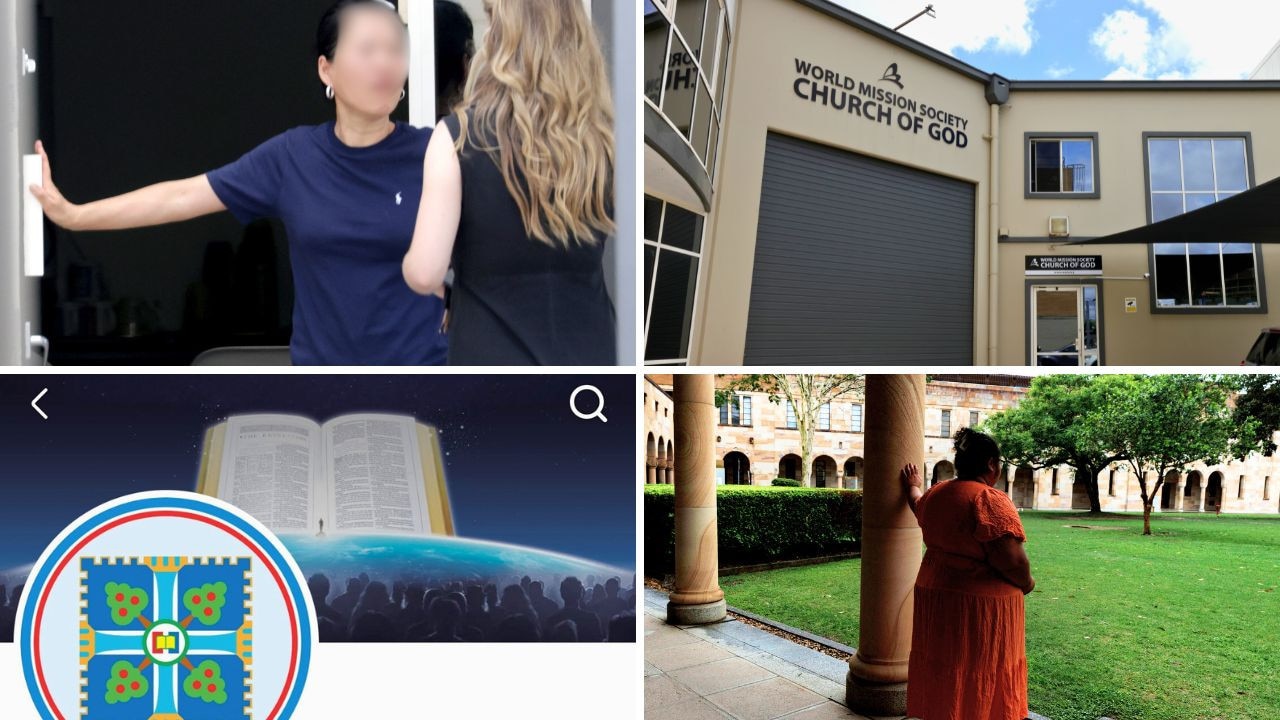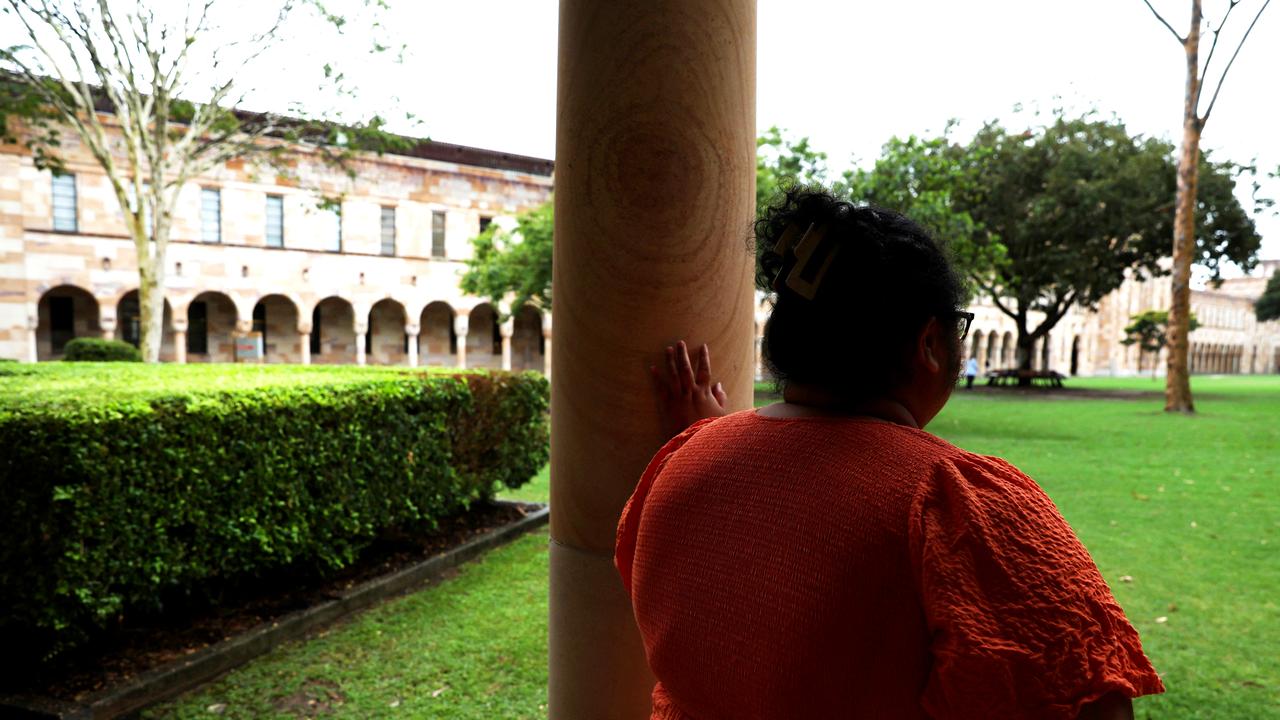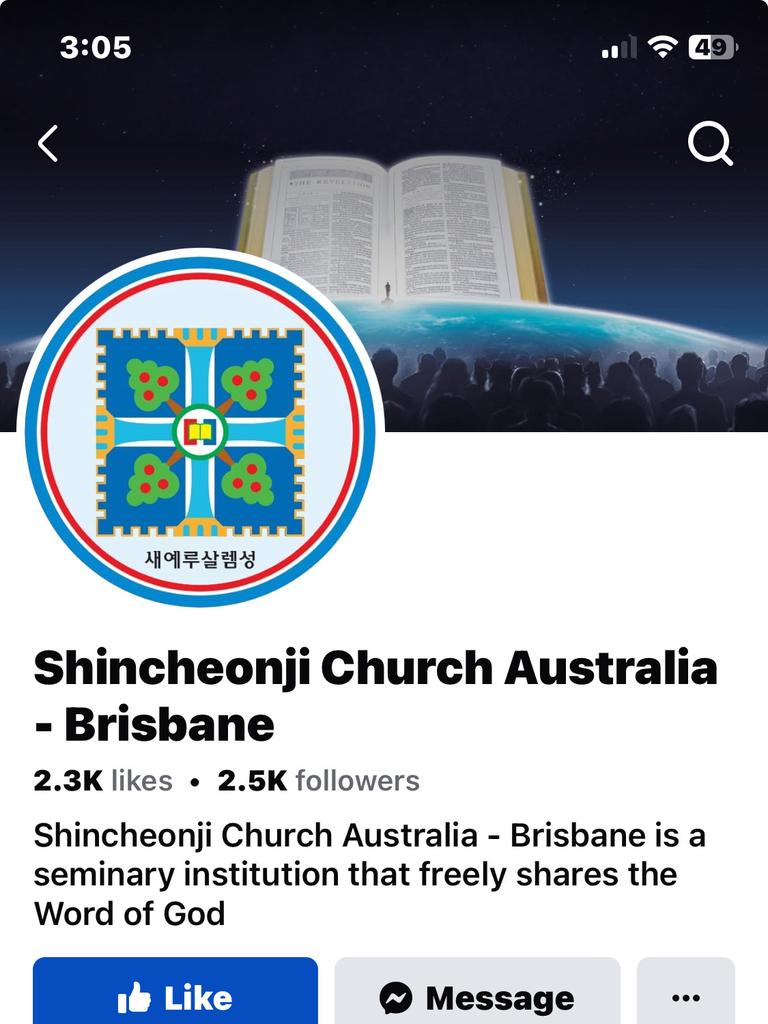Students speak about religious groups and the ‘high-pressure’ tactics to join
Students at some of Queensland’s biggest universities are being preyed on by religious sects. This is how you can tell if your child has been targeted.

QLD News
Don't miss out on the headlines from QLD News. Followed categories will be added to My News.
Students at some of Queensland’s biggest universities are being targeted by religious sects that force them to give up their phones and wear head coverings during services while pushing them to get baptised during their first visit.
And experts warn orientation week, or O-Week – currently running at unis across the state – is considered prime recruiting time for the growing and “insidious” religious and church organisations stemming from Asia, and that universities aren’t doing enough to protect their students.
South Korea-based Shincheonji Church and World Mission Society Church of God are among the groups recruiting students from Queensland University of Technology and The University of Queensland, but both organisations deny targeting students.
Raphael Aron, who is a consultant focused on religious groups, said Shincheonji Church’s increasing presence on campuses in Australia now made up about 30 per cent of his work.
“We would certainly get at least half a dozen inquiries up in relation to this group each month,” he said.
He said O-Week was one of the “better” times of year for organisations looking to recruit new members.
“I can tell you quite a few of the people we’re talking with would have been recruited or at least introduced to this organisation during O-Week,” he said.
“Some of the groups also tend to be around at the end of the year when university results come out and people are often disappointed with what they’ve done and are sort of given a helping hand.”

Tore Klevjer, a counsellor specialising in controlling religious organisations, said groups including the Shincheonjis targeted numerous universities throughout Brisbane, particularly QUT.
“I’ve had quite a bit to do with ex-members from that group (Shincheonji Church),” he said. “ … they don’t identify themselves. I’ve even heard stories of Shincheonji going up to students and saying, ‘we are not Shincheonji, you might have heard that they’re a cult’, it’s not till way down the track that they reveal that they misrepresented themselves (about who they are),” he said.
Mr Klevjer said the Shincheonji Church could take up to a year to identify who they were to members and often invited recruits through free bible study, sports clubs or magic classes.
QUT confirmed it was aware that “high-pressure groups are active at times around the campuses” and had taken action to develop an online resource for students but that it had not received any formal complaints.
A 2024 UQ graduate, who spoke under the condition of anonymity, opened up about her time as part of the Shincheonji.
Speaking under the pseudonym Nicole, she said she was part of the church for about six months before leaving at the beginning of 2023.
She was originally approached by a student looking for friends online from QUT and before she knew it was expected to dedicate four days a week to bible and church study.
“We were just talking back and forth socially for a bit and then she, after we talked for a few days, she was like, ‘Oh my gosh, do you want to catch up?’ And it was just like, from this perspective of being friends, essentially,” she said.

“Then we ended up doing bible study which was like twice a week and then it was Monday, Wednesday, Friday,” she said.
Nicole said after the “bible study phase” she was told to take an exam which she had to get 100 per cent on before going to the services held in person.
“They wanted us to memorise questions and the answers word for word.”
She said various members had dropped out of work and university to devote more time to the Shincheonji Church’s commitments.
“There were some days that I was sick and like, that wasn’t a good enough excuse,” she said.
She described the services as “really odd” and said they were strictly required to wear a white shirt and black pants.
“We couldn’t just, like, sit cross legged, pretty much just like, if you sort of just sit on your knees and then you sit back on your heels,” she said.
Nicole said the church had told them it was not a cult “and they went through all the reasons why they weren’t a cult”.


Nicole said she decided to “ghost” the group in January of 2023 by not turning up or replying to any messages.
After she left, Nicole said she was left with a “scary” feeling as a result of the teachings by the Shincheonji Church.
“And then I got back into normal life, and I was like, I’m actually fine, life is OK, but then the first few times they reached out, that sort of weird feeling came back on, like ‘am I just doomed?’” she said.
UQ Student Lisa Alamu was 17 when the World Mission Society Church of God approached her and her friend at UQ Lakes and she attended one of the services in 2016, where she felt “scared”.
Ms Alamu said in the service women were required to cover their head with a white cloth and that by the end of the service, which was a “red flag”, members were trying to baptise her that same day.
“The lady was holding my hand, and she was like, ‘I really want you to get baptised today’,” she said.
Some students reported being tracked down and approached on social media after the groups found their names in online university forums.
In a private Facebook message sent to students from a student forum at QUT, a separate group, who did not reveal who they were, advertised “bible study”.
“Sorry if my message took you by surprise but I saw you on Facebook group located in Brisbane. I’m actually inviting anyone who is keen to join a bible study, would it be something you are interested in? I hope you have a good day! God Bless,” the message said.
Sect expert and author Sarah Steel said Australia needed to collectively call for more education around these groups.

“We’re just sort of allowing these groups to run rife and not really doing much about it, and then not providing any support services for people who come out of them.”
A UQ spokeswoman said it encouraged students to contact security in the event of unwanted approaches or conversations on its campuses.
The World Mission Society Church of God said UQ students were among its congregation but that it did not actively recruit members from the university.
“According to God’s teaching, we are preaching. However, after they listen our preaching, only when they willingly want, they become our members, and if they don’t want, we don’t force them to become our members. And when they feel uncomfortable, we don’t preach to them,” a World Mission Society Church of God statement said.
“Some students came to church and kept worship. However, we didn’t force them to keep worship. Only when they have a time and they are willing, we told them to come. And we didn’t tell them to come to church when they cannot come due to their personal schedule,” a member said.
In a lengthy statement, the Shincheonji Church and Zion Mission Centre said “rumours” about their operations “don’t match the reality”.
“We never pressure anyone to accept our message, but we believe it’s important to share the good news of the Bible with those who are willing to listen,” it said.
Neither Shincheonji Church or the World Mission Society Church of God are registered religious denominations in Australia, according to Attorney-General’s Department.
World Mission Society Church of God is, however, a registered charity.






